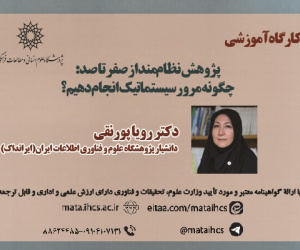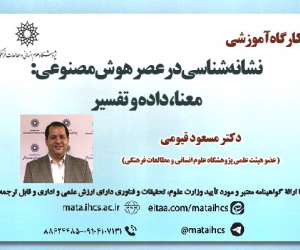بررسی عوامل موثر برتوانمندسازی اجتماعی زنان (مطالعه موردی شهر گیلانغرب) (مقاله علمی وزارت علوم)
درجه علمی: نشریه علمی (وزارت علوم)
آرشیو
چکیده
هدف تحقیق : توانمندسازی زنان در عرصه های مختلف سیاسی، فرهنگی، اقتصادی و مدیریتی از مباحث مهم در جوامع امروزی می باشد. مطالعهٔ حاضر با هدف واکاوی ابعاد مختلف توانمندسازی اجتماعی زنان شهرگیلانغرب انجام شده است. روش تحقیق : تحقیق حاضر به شیوه روش پیمایشی انجام گردیده است جامعه آماری تحقیق شامل زنان شهر گیلانغرب بودکه با روش نمونه گیری هدفمند تعداد ۳۷۲نفر به عنوان جمعیت نمونه انتخاب شد. برای بررسی ارتباط بین توانمند سازی زنان و اینکه چه چیزی تصمیم گیری و نگرش خانواده ها نسبت به تصمیم گیری و مشارکت در امور خانواده را تعیین می کند، از تحلیل رگرسیون چند جمله ای استفاده شد. یافته ها: یافته های تحقیق نشان دادند: متغیر های میزان تحصیلا ت، سن، ثرو ت و تعداد فرزندان، سن زنان، تعداد فرزندان، شغل همسر و نوع کسب و کار با توانمندسازی زنان ارتباط مثبت دارند و بر میزان مشارکت و تصمیم گیر ی در خانواده ها تأثیر می گذارد.نتیجه گیری: تشویق به مشارکت زنان در فرآیند توسعه، از طریق فراهم آوردن فرصت های مشارکت آن ها بسیار مهم است، این فرصت ها باید تمام جنبه های اجتماعی، فرهنگی و غیره را در بر داشته باشد تا با تشویق زنان به مشارکت، آگاهی آن ها افزایش پیدا کند.An Investigation into Determinants of Women's Social Empowerment: A Case Study of Gilangharb City
IntroductionWomen's empowerment has become a key priority for sustainable development worldwide. Even in developed countries, it is considered a fundamental factor, as women in these nations experience various forms of discrimination in different ways. For developing countries, gender inequality has emerged as one of the most significant barriers to progress. Indeed, women's empowerment has been reflected as an important indicator of sustainability, success, and well-being for women, wherein all members of society can be viewed as active social forces.The World Bank (2001) in its reports introduces gender equality both as a development goal and as a tool for growth, poverty reduction, and promotion of better governance [cited in: (Chutia, 2022)]. Women's empowerment is a comprehensive and multidimensional concept. It relates to economic, social, political, and other aspects of life.Malhotra defines women's empowerment as a process by which women become empowered to organize themselves, increase their self-confidence, and defend their rights to independent choice and control over resources, which leads to an elevation of their status. Empowerment encompasses various components and assumes that empowerment is a process from inability to becoming empowered. Integrating these perspectives, it can be said that empowerment is a multifaceted process that includes awareness, beliefs, and individual and collective behaviors embedded in the social structure of specific cultural contexts.Women's empowerment is important not only for themselves but also for the societies in which they live. However, there are numerous barriers that women face in the social sphere that hinder their career advancement. Additionally, urban women often face problems such as air pollution, traffic, and high living costs that affect their quality of life and ability to fully participate in society.Research shows that misconceptions and gender stereotypes can have profound negative effects on women, to the extent that these beliefs are sometimes unconsciously internalized by women themselves. This can lead to reduced motivation for progress and success among women.The development of societies requires that all members of society, including women, be able to participate in and benefit from the growth and transformation of their society. The role of women and girls and overcoming the limitations they face, especially in underprivileged and underdeveloped areas, is of paramount importance. Accordingly, the objective of the present study is to examine the determinants of social empowerment of women in Gilangharb city, particularly what determines women's participation in decision-making. In this regard, the following question is posed:- What impact does access to empowerment resources (education, employment, income, wealth) have on women's empowerment?MethodologyThe present research is applied in terms of purpose and descriptive-analytical in terms of method. The statistical population of the research includes all women in Gilane,gharb city. According to the report of the Statistical Center of Iran, 2016, 14,309 households resided in this city, of which 24,487 were men and 24,601 were women. The sample size was determined to be 372 questionnaires using the revised Cochran's formula, and was finalized after necessary reviews.For data collection, a structured questionnaire was used. For example, the extent of women's control over income and assets was measured by responding to the question "If needed, I can use my income, cash savings, and assets." The ability to participate in decision-making processes was measured by the statement "I can participate in family planning, household expenses, education and marriage of my children, as well as in buying or selling property, etc."The validity of the questionnaire was assessed and confirmed using content validity, which is determined by experts in the subject of study. To measure reliability, a pre-test sample of 30 questionnaires was taken, and the reliability coefficient was calculated using Cronbach's alpha method at 0.83. For data analysis, statistical methods (descriptive and inferential) were used in SPSS 20 software. The levels and scale of the data were ordinal, and some had an interval scale, with normal distribution of variables. Multiple regression was used for inferential statistical analysis.Results and discussionThe findings of the research, based on the results of multiple regression analysis for each of the empowerment indicators, indicate that older, educated, and employed women participate more in decision-making processes. Employed women, due to their greater awareness of their rights and duties, play a more prominent role in addressing family issues and other matters. These women, compared to others, possess higher levels of education, income, and social capital, which enhances their awareness and makes them more empowered in utilizing their capabilities effectively.ConclusionUnderstanding the cultural and social context of the community is essential for comprehending the transformations in women's empowerment. Encouraging women to participate in the development process can be achieved through education, changing negative traditional cultural norms, and providing vital participation opportunities. This understanding can lead to the creation of more effective programs and projects aimed at increasing women's participation in development processes, reducing poverty, and improving their quality of life.







